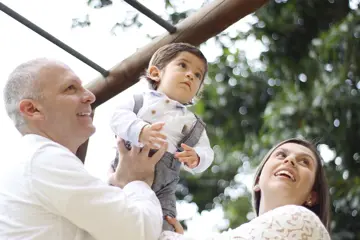While fostering and adoption are often discussed together, they are two different processes. Fostering is about offering temporary care to a child who is unable to live with their own family. Adoption is the legal process that allows a child to become permanent, legal members of a new family. Below, we explore other key differences between fostering and adoption.

What is fostering?
-
Foster carers offer temporary or longer-term care to children who are unable to live with their own families (sometimes called their 'birth families').
-
A foster carer does not have legal 'parental responsibility' for the child or children in their care. Parental responsibility is usually held by the local authority and birth parents.
- Instead, a foster carer may have 'delegated authority' to make some day-to-day decisions about the child.
-
The foster carer will have a fostering agreement with their fostering service, and will work in partnership with other agencies to care for the child.
-
All foster carers are self-employed and are registered with one fostering service. They will have terms of approval that might specify details like the number and age of children they can care for, and the type of fostering they can provide.
-
Prospective foster carers are subject to an assessment. The prospective carer assessment is in two stages and will also include training.
-
Foster carers promote contact, education, health and leisure activities to support the child’s development.
-
Foster carers are needed from all walks of life to help children flourish.
-
Foster carers do not have to be British citizens but must have the legal right to remain in the UK.
What support do foster carers receive?
- Foster carers will receive regular supervision and support from a supervising social worker from the fostering service. The child in their care will also receive regular visits from their own social worker.
- Foster carers receive mandatory, ongoing training in a range of specialist areas to support their role.
- Foster carers also receive a fostering allowance to cover the cost of caring for a child. The exact amount varies, depending on the fostering service's policy, but it must meet the recommended minimum allowances. Many fostering services may also offer foster carers a fee or skills payment for their fostering role.

What is adoption?
-
Adoption is the legal process through which a child (or sibling group) who is unable to be cared for by their birth family becomes a full, permanent and legal member of a new family.
-
The adopter(s) become legal parents and acquire all rights and responsibilities for the child, just as they would have done if the child had been their birth child.
-
Once an adoption order is granted, the child is no longer considered to be a ‘looked after child’ (i.e., the child is no longer under the care of the local authority).
-
Adopters must be over 21 and legally resident in the UK, the Channel Islands, or the Isle of Man for at least 12 months.
-
The process of adoption is typically described in four stages. Read more about the adoption process on the First4Adoption website (external site).
What support do adopters get?
- Initially, adopters will have joint parental responsibility with the child’s adoption agency and birth parents (although the balance of this varies). There will be regular reviews and support visits by the adoption agency to make sure that everything is going well.
- This support will continue for a minimum of 10 weeks. After this time, and once the adopters feel ready to take on full parental responsibility, they will apply to the court for an Adoption Order.
- Some adoption agencies may, dependent on the adopters circumstances and/or the needs of the child, pay an adoption allowance. This may be means tested and may be time limited.
- Adopters are eligible for statutory adoption leave and pay unless they are self-employed.
- Post-adoption support will be offered, and is tailored to the specific needs of the adoptive family. Read more about adoption support on the First4Adoption website (external website).



